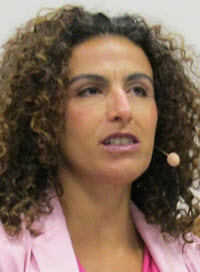Abstract
Excerpted From: Sahar Aziz, Racing Religion in the Palestine-Israel Discourse, 118 AJIL Unbound 118 (2024) (45 Footnotes) (Full Document)
 Race is a Western political project. Religious freedom is a Christian political project. The linkages between the two enabled European nations and their settlers across the globe to condemn natives, slaves, and non-European immigrants to inferior status, and in turn legalize control of their lands and bodies. The consequent race-religion systems of power and privilege, which inform Rabiat Akande's thesis, offer valuable insights into the racialized boundaries of contemporary Palestine-Israel discourse in the United States. Specifically, the racialization of Muslims and Arabs as terrorism supporters and presumptively anti-Semitic subjects them to censorship, harassment, and discrimination when they advocate for the human rights of Palestinians in Gaza and the West Bank. This essay argues that infringements on Muslims and Arabs' dissenting speech and political activism is another way in which the racialization of religion produces a mutually constitutive form of discrimination.
Race is a Western political project. Religious freedom is a Christian political project. The linkages between the two enabled European nations and their settlers across the globe to condemn natives, slaves, and non-European immigrants to inferior status, and in turn legalize control of their lands and bodies. The consequent race-religion systems of power and privilege, which inform Rabiat Akande's thesis, offer valuable insights into the racialized boundaries of contemporary Palestine-Israel discourse in the United States. Specifically, the racialization of Muslims and Arabs as terrorism supporters and presumptively anti-Semitic subjects them to censorship, harassment, and discrimination when they advocate for the human rights of Palestinians in Gaza and the West Bank. This essay argues that infringements on Muslims and Arabs' dissenting speech and political activism is another way in which the racialization of religion produces a mutually constitutive form of discrimination.
Importing the concept of race from Europe, Americans' social constructions have been historically grounded in three phenomena: enslavement of Africans, settler colonialism of Indigenous peoples, and phenotype of immigrants associated with their geographic origins. Defining the criteria for each racial category is integral to the work performed by racism. For instance, what constitutes Blackness, such as one drop of African blood, determines who could legally be enslaved; just as what constitutes whiteness, such as exclusively European origin, historically determined who was eligible for citizenship, property ownership, and political rights. Akande's work echoes critical race theory scholarship in determining how Eurocentric colonialist agendas, not biology, socially and politically constructed race and attendant hierarchies of (dis)empowerment.
Western social constructions of race, however, are also defined by religious identity. Akande aptly describes how Europe's religious freedom projects, often disguised under “civilizing mission(aries),” operated to justify colonization. Likewise, the hierarchies within the social constructions of whiteness were shaped by religious identity. Protestant Northern and Western Europeans, for example, were historically raced as superior to Eastern and Southern Europeans, who are predominantly Jewish and Catholic. These racio-religious hierarchies were brought to North America, contributing to anti-Semitism and anti-Catholic discrimination in the twentieth century and heightened anti-Muslim discrimination today.
[. . .]
The stark disparity in treatment by the U.S. government, universities, and media in the Palestine-Israel discourse demonstrates how religious identity racializes Muslims as the dangerous “Other” while racializing Jews as in-group members of American Judeo-Christian identity, corroborating Akande's claim that race-religion is hierarchical not binary. The precarity of racial minority status arises from the prospect of moving up or down the racio-religious hierarchy, as whiteness secures permanent privilege.
While the increased vigilance against anti-Semitism is a welcome change after centuries of discrimination in the West, Muslims (and by extension Palestinians) remain outsiders to white Judeo-Christian systems of power and privilege in the United States. U.S. imperialistic objectives in the Middle East are perversely pitting anti-Semitism against Islamophobia through America's unconditional support for Israeli colonial practices grounded in the same racial logic that justified centuries of European anti-Jewish violence. Thus, Akande's call to incorporate into law mutually constitutive discrimination on the basis of race-religion applies beyond “imperial histories” to the present day realities of Muslims in the United States.
Distinguished Professor of Law & Chancellor's Social Justice Scholar, Rutgers University Law School, Newark, NJ, United States.


